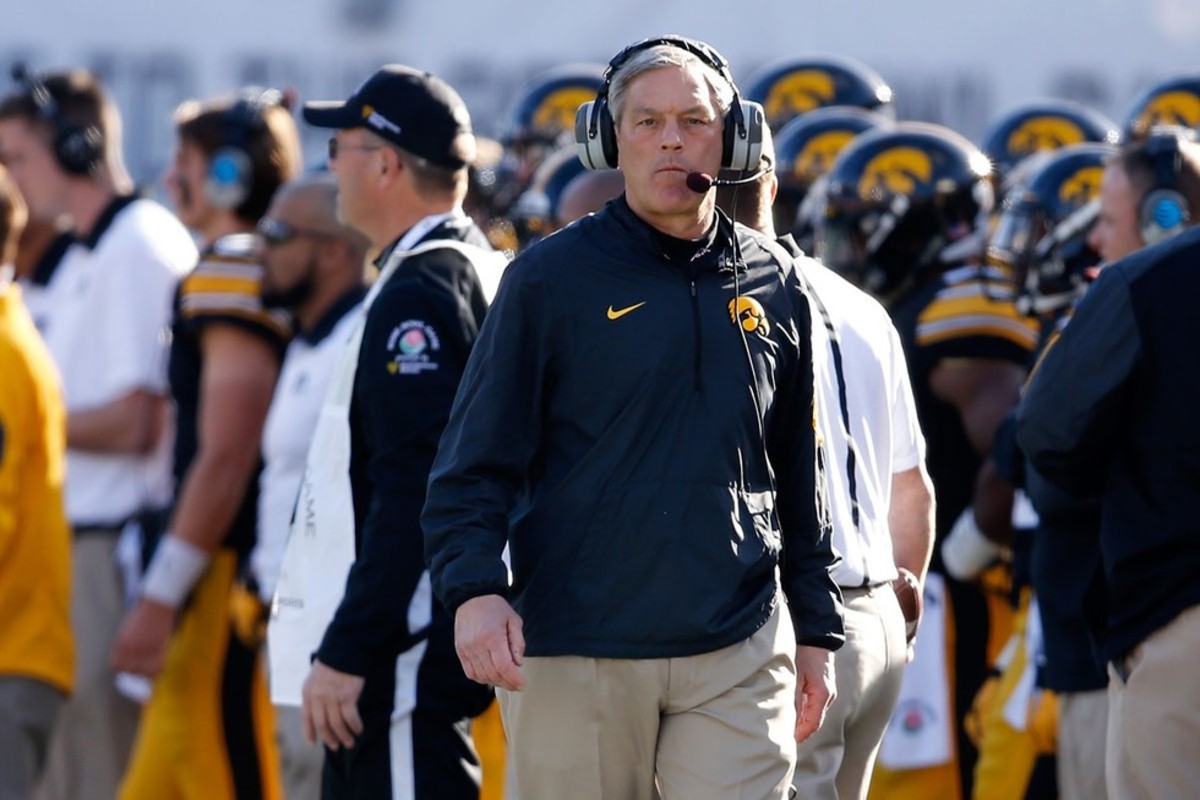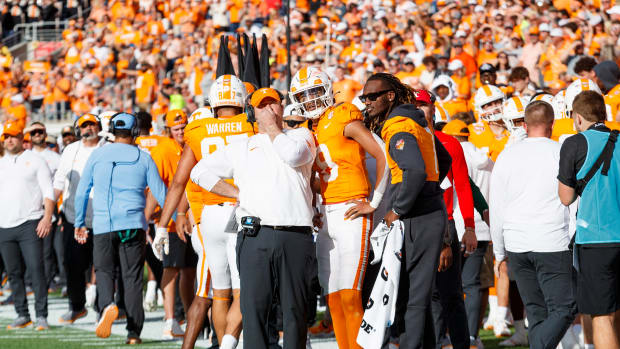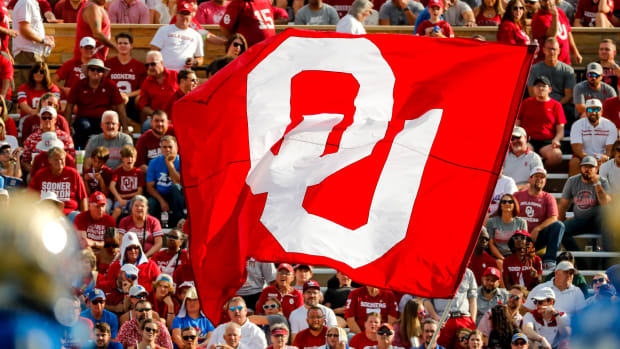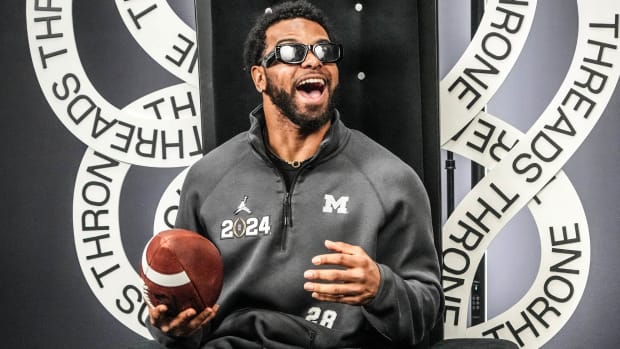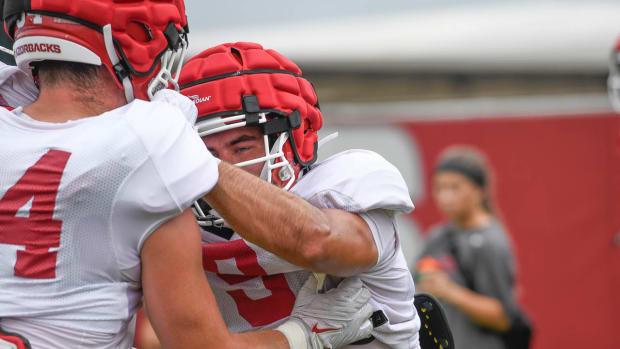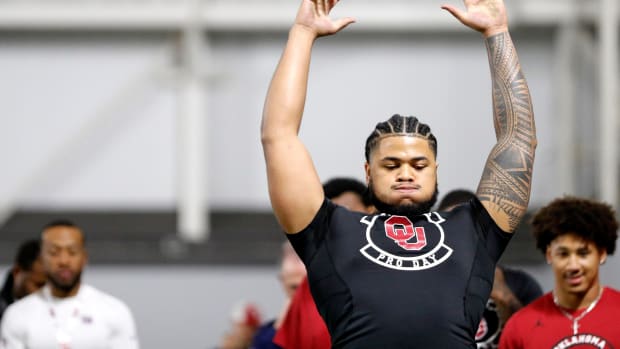Iowa coach Kirk Ferentz discusses his 2016 expectations, quarterback C.J. Beathard and the keys to longevity
[video: 13724903]
Iowa was one of the pleasant surprises of the 2015 college football season. The Hawkeyes used one of the best defenses in the country to cap an undefeated regular season for just the fifth time in program history. But after reaching the Big Ten title game, they fell to Michigan State, 16–13 before losing to Stanford, 45–16, in the Rose Bowl.
Still, a 12–2 campaign in 2015 means Iowa won't sneak up on the Big Ten this fall. Campus Rush caught up with Hawkeyes coach Kirk Ferentz to talk 2016 expectations, under-the-radar Hawkeyes, satellite camps, Bill Belichick and more.
Campus Rush:You told reporters during your pre-spring press conference that Iowa's success in 2015 guarantees nothing in 2016. Has that been the theme of the off-season in the locker room, as well?
Kirk Ferentz: It really was the same message we gave them a year ago. We didn't finish the 2014 season the way we wanted to; we had a couple of games with really disappointing outcomes. So going into 2015, our point was it's a new year and a new calendar—most importantly, it's a new team. We just have to invest the work like we did a year ago.
CR: Towards the end of the regular season, you guys had gained so much attention for being undefeated. Did it become difficult to prevent your team from focusing on perfection?
Ferentz: You really touched on what the key is: keeping your focus where it needs to be. I think that's the thing I would say about last year's team, it really did a good job of taking things one week at a time. We talk all the time about having 12 games that are guaranteed on our scheduled. The bottom line is, you know the games that are on your schedule, and the challenge is to prepare each week. Last year's team did a really nice job of handling that. That's always been the story of Iowa football, a really fine line between victory and defeat. So you need to prepare that way.
CR: After a remarkable regular season, how did consecutive losses in the Big Ten title game and the Rose Bowl affect your off-season?
Ferentz: The only regret I have about our bowl game last year was we didn't play in a way that was representative of our football team in 2015. We lost our edge a little bit in that bowl game, and it was a bad combination playing a really good Stanford team that was playing about as well as it had all season long. We went through something similar to that in 2002 in the Orange Bowl [a 38-17 loss to USC], so hopefully we'll learn from that.
STAPLES: Exploring the SEC West's critical coaching mass; Punt, Pass & Pork
CR: What areas did you need to address this spring? It sounds like you singled out the receiving corps at one point.
Ferentz: If you look at us offensively, that's where we start. We graduated two very good offensive linemen, Austin Blythe and Jordan Walsh, but we had more injuries last year than I can remember in any season. If there's a silver lining to that, it's that we had a lot of guys get experience. But I feel like our offensive line is not garnering the same attention as our wide receivers, where we lost two seniors, Jacob Hillyer and Tevaun Smith, and a tight end, Henry Krieger Coble, who had a really outstanding senior year.
After that, we've got to really develop some players. The receiver position is kind of one that's open right now. Matt VandenBerg is our most veteran guy, and he's done a lot of good things for us. Riley McCarron's a senior who earned a scholarship a year ago. After that, we're pretty young. We're making progress but we're hardly ready to go at this stage.
CR: C.J. Beathard evolved into a bright spot at quarterback last season, compiling 3,046 yards of offense in 14 starts and earning second-team All-Big Ten honors. How can he get better?
Ferentz: I don't think there's any one area. As with any player, hopefully experience allows you to play a little faster and process things faster. At quarterback, that's really important. The biggest thing is, he really wasn't healthy for the majority of last season. It's also not like he was a four-year veteran. This was his first year playing. Considering the limited amount of quality practice and mobility, I thought what he did was impressive. It really speaks to his tenacity. This fall, to have him healthy and practicing and running the team, that's going to be a real benefit.
CR: Getting cornerback Desmond King back for his senior season is huge for your defense. He won the Thorpe Award and became a consensus All-America selection last season. How close was he to declaring for the NFL draft?
Ferentz: It's interesting because we've had two in a row now. Before the 2014 season offensive lineman Brandon Scherff, who went fifth overall in the '15 draft, went through the same process. I told both players pretty much the same thing: there are few times in life where you get to make decisions based on what you want to do, instead of what you have to do or should do. I told them both, you will be playing in the NFL. Whether you get there this year or a year later, it probably won't make a huge amount of difference in your career or financial earning power. Do what you really feel compelled to do, don't do what people think you need to do.
CR: Who are some under-the-radar players Iowa fans should watch for in the fall?
Ferentz: We lost both of our defensive ends, kinda-sorta. Drew Ott was out most of the year (and had his request for a medical hardship waiver denied by the NCAA) so Parker Hesse got thrown in probably before were were ready to throw him in. As a result, we feel like he's more prepared this year to play, and he had a really good spring. We also feel like we've got a guy in Matt Nelson who is ready to step in and do a good job on the other side in place of Nate Meier. It's kind of diffused the loss of experience.
One other thing people aren't talking about: we graduated a two-year punter, Marshall Koehn, and a two-year kicker in Dillon Kidd. That's probably just as big an area of concern.
CR: What's your take on the satellite camp debate, from the process of banning and un-banning them to the camps themselves?
Ferentz: The process I won't even comment on. It's almost embarrassing. But a couple of things jump out to me. First off, I find it amusing in some ways because no one was really talking about these camps two or three years ago. We've had these opportunities available for a long time. But the bigger story to me is, outside of one school, everybody I've heard talk about it seemed to place emphasis on missed evaluations and missed opportunities for prospects. That sure sounds a lot like recruiting talk to me.
For any alien who dropped out of midair onto Earth, if they looked at this thing just knowing nothing other what's presented, our recruiting calendar really controls what we do in the spring recruiting season. Then we have very specific rules on what we're allowed to do when fall recruiting and evaluations begin. I just find it interesting that there's no control in June. If we're going to allow people to go out and evaluate prospects, I would think it's be fair to say that we limit it, or at least come up with a fair set of ground rules like we have in spring or fall or winter. This is one month that's a total free-for-all.
CR: People might be surprised to hear Iowa plays the reigning national champions next season: North Dakota State, which you face on Sept. 17 and is coming off its fifth straight FCS title. That's a tougher nonconference matchup than it appears.
Ferentz: Yeah, maybe we're not too smart. In 2015 we played Illinois State, who had lost to North Dakota State in the FCS title game the previous year. In 2014 we played Northern Iowa, who beat both North Dakota State and Illinois State that same season. We play Northern Iowa every five or six years in our state. But North Dakota State really caught my attention six or seven years ago when they beat Minnesota. They're an outstanding program.
If you go back to 2009, we had to block two field goals to beat Northern Iowa in our opener. That year we went on to win the Orange Bowl and finish ranked seventh in the country. So that's a good illustration just how good they were, and it's how good we expect North Dakota State to be when we play them.
CR: You've been fortunate to coach under two legends of the sport in Hayden Fry at Iowa and Bill Belichick with the NFL's Cleveland Browns. How have guys like that impacted your career?
Ferentz: I've had great mentors every step of the way. I'd be remiss not to mention the late Ted Marchibroda, whom I coached under with the Baltimore Ravens in the NFL. In my six years in the NFL I worked with two tremendous head coaches. Bill Belichick actually started under Ted; that was his first job. Bill was the guy who drove the car and picked guys up from the airport. That was his first job with the Colts.
But I've been lucky that way. I worked for Coach Fry and he really helped establish my belief system for college football. Then with people like Belichick and Marchibroda, that's a rare opportunity. I'm sure you do the same in your business; if you pay attention, you can't help but learn.
THAMEL: Clay Helton discusses his adjustment period as USC's new head coach
CR
: You were on the same Browns staff as Nick Saban, right?
Ferentz: Yeah, Nick and I were together for two years from 1993 to '94 before he got the Michigan State job.
CR: I assume you knew he'd win four national championships in seven seasons one day.
Ferentz: [laughs] You wouldn't predict that for anybody, I don't think. But that being said, he had great success at Toledo. He was a great coach there and then did an outstanding job with the defense at Cleveland. Every job he took after that, he did a great job. The Miami Dolphins' thing is a different discussion. But going to LSU and then certainly at Alabama, he's had great success. Nick is an outstanding coach and a very persuasive recruiter on top of it. He's at a place where you can recruit really good players, so that's a lethal combination if you're competing against him.
CR: You are entering your 18th season as a head coach at Iowa. What's been the key to your longevity?
Ferentz: A quick aside to that: a lot of guys who have had long coaching tenures have had Iowa connections or coach [Hayden] Fry connections. [Oklahoma head coach] Bob Stoops and I were hired at our current schools about one day apart. When I was an assistant in the NFL with the Browns and the Ravens, I followed college teams from afar, and Coach Fry, he was here for 20 years. The only other two college programs I followed were Wisconsin and Kansas State. Barry Alvarez was the first guy I met when I interviewed out here in 1981, and Bill Snyder was our offensive coordinator during my first eight years here as an assistant. So, there seems to be a recurring theme there.
But it was easy for me to come back here after I'd been an assistant at Iowa from 1981–89. My wife and I knew the community and the quality of life, and professionally we knew it was a great place. It's given us a chance for our family to know where home is. Long story short, we've found great happiness here. We've gotten five kids out of one high school, and we're close to having five kids get degrees here.
I've also believed that if you do things right with the right people, you'd have a chance to play at the highest level. We don't start on the inside lane typically; if you look at the last 50 years, it's been Ohio State and Michigan who have had the inside lanes. But the fact is that in our conference, basically everybody has a chance if you're doing things right. I just haven't had a really compelling reason to leave, I guess.
